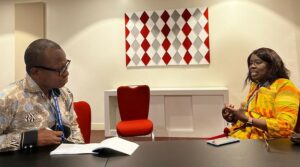Africa must find solutions to African problems – Diop (Part 1)

We bring you the first part of an exclusive interview with Ms Ngone Diop, the Director of the Economic Commission for Africa, Sub-Regional Office for West Africa in which she delves into the opportunities and challenges of Africa and how to address the demands for transformational change. This first part of the interview focuses on West Africa.
African countries have been called upon to lead the way in finding solutions to the continent’s problems, and not wait for others.
“As a continent, we can’t continue to wait for others to help us, we need to lead the way to find our own solutions to African problems,” Ms Ngone Diop, Director of the Economic Commission for Africa (ECA), Sub-Regional Office for West Africa has said in an exclusive interview with Ghana Business News at the sidelines of the Eighth Africa Regional Forum on Sustainable Development in Kigali, Rwanda.
She said even though Africa has low COVID-19 infections, the economic impact of the pandemic has been deeper on the continent.
According to the World Health Organisation, 47 countries in Africa recorded a cumulative infection rate of over 7.9 million with 169,155 deaths.
“COVID-19 has been a wake-up call to the continent,” she said.
The economist with deep and vast experience in working in and with African countries in various capacities in development and budgeting took office a little over two years ago as the Director of the ECA’s West Africa office.
Ms Diop began her deep delve into Africa’s development discourse when she discovered through her studies as an economist that the conventional data and evaluation available didn’t reflect the realities as they were limited and particularly did not reflect many forms of inequalities that were more critical in Africa.
West Africa
Ms Diop who spoke to Ghana Business News on a wide range of subjects described West Africa as “A region with magnificent opportunities but also pervasive structural challenges. Very youthful population – which for others is a challenge, but for us, it is an opportunity,” she said.
“I will describe the West Africa situation as the paradox of plenty. We have everything, but everything doesn’t mean anything to us, because everything has been turned into very complicated development context,” she added.
She touched on the geopolitics and geostrategy of the West African region. “When you are dealing with a region that is so rich in human resources, and natural resources, in short, we have the paradox of the plenty. That paradox of the plenty has many mutually reinforcing factors, and one of them is governance. Social, political and economic governance is a wholistic package, which if implemented fully can lead to transformational results which would leave no one behind,” she said.

Ms Diop pointed out that there are mixed results in the region, especially political government which should not limit itself by only elections, but one that has the right institutions and can deliver development outcomes to the people in a sustainable way. She noted that political governance shouldn’t only deliver elections, even though elections are part of the package, but also have the right institutions.
Citing Ghana, Senegal and Niger as good examples of countries with democratic governments, she said despite the ups and downs with some countries, the region has solid democratic systems. However, she believes that consolidating the achievements at the democratic, governance and the whole transformational levels and moving forward with clear cut indicators of change that is measurable and can be monitored are important. The democratic process must be a process of empowerment and self-reliance, she said, adding that all the population must be empowered, if all the institutions are strong enough to safeguard the empowerment of the population and whatever achievement that can be built upon to create a momentum of change that is sustainable, inclusive and not leave anyone behind.
West Africa’s population
With a population of more than 400 million, and a population growth increasing each year, young people aged between 15 and 26 years make roughly 60 per cent of the population, and this does have policy implication.
“To understand the policy implication, you have to look at the needs of the population. In economic terms we call it the life cycle deficit. The life cycle deficit are the needs of the population. The needs in terms of jobs, health and so on. The needs are huge, and we are estimating that need to be around $400 billion. You need to have the right mix of policy to invest in a very effective, efficient way to tackle, respond to those needs to provide them with what it takes to empower them,” she explained.
She argued further that to address the paradox of the plenty, West African countries would have to empower their people wholistically – economically, politically and socially to be able to transform the countries and the region.
She noted further that West Africa has everything to develop. “We have 15 countries in the region. More than 400 million population, let us plan effectively to move our region forward – unlocking the many potentials we have, adding value to our natural and mineral resources, and be able to transform our economy. We have all we need, but we have to add value to our resources. Unless we transform our economies, unless we create jobs through the transformation of our economies, the challenges and the paradox of plenty would lead to more conflict,” she said.
The West African region she says needs urgent transformation.
“We need to invest in the transformation. We need good governance, vision, policy and we must move from policy to actual transformation,” she added.
By Emmanuel K. Dogbevi, in Kigali,Rwanda
Copyright ©2022 by NewsBridge Africa
All rights reserved. This article or any portion thereof may not be reproduced or used in any manner whatsoever without the express written permission of the publisher except for the use of brief quotations in reviews.
